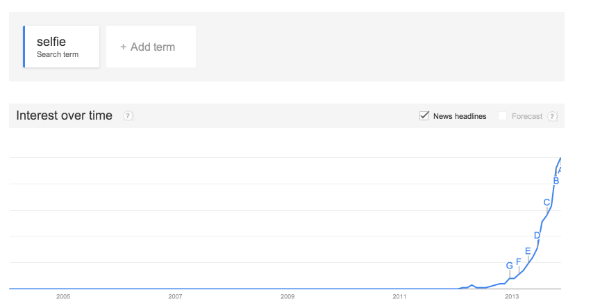A good “word of the year” will sum up our culture as it was during that particular orbit around the sun. Given that more and more tools are created every day that encourage us to focus on ourselves—to publicly share our opinions, our whereabouts, our calorie intakes, our playlists and our dogs’ mistakes—Oxford Dictionaries’ choice certainly seems to capture the zeitgeist: 2013 was a selfie year.
For those 9% of Americans who still don’t have a cell phone, this is how Oxford defines selfie:
(n.) a photograph that one has taken of oneself, typically with a smartphone or webcam and uploaded to a social media website.
Explaining why that word won the crown, Oxford editors note that usage of selfie has gone up 17,000% since this time last year. That’s according to their new word monitor, which scans web content and collects 150 million words each month. A dedicated team of editors thumbs through that data, which help determine when words should be welcomed into Oxford’s dictionaries. Though it so far hasn’t made the cut in the venerable Oxford English Dictionary, selfie was added to the hipper Oxford Dictionaries Online this August.
Oxford doesn’t require that a winning word come into existence during that calendar year, just that it “become prominent or notable in that time.” In 2013, selfie made it into countless headlines about celebrities and political scandals. It became the crux of museum exhibits dedicated to examining this modern form of digital expression (**adjusts monocle**). The word even made its debut on the judicial circuit, when a U.S. district court for North Carolina adopted TIME’s definition to support issuing a warrant for an alleged criminal’s cell phone.
The Oxford research team traced the usage of selfie back to 2002, when an Australian described a photo he or she had taken after landing “lip first” on a set of steps. What may have been the coinage of a hungover Aussie rambling in an online forum exploded over the past decade, helped along by the widespread adoption of smartphones. And the biggest bang in that explosion came this year. Just take a gander at this Google Trends chart showing search volumes for the term:
Oxford also released a shortlist of other words that didn’t quite make the cut. Among them are reminders of how digitally focused our lives have become and proof that Miley Cyrus‘ death grip on the world’s attention doesn’t extend to lexicographers—yet. Some might even argue that “twerk” was robbed.
bedroom tax: (n., in the UK) a reduction in the amount of housing benefit paid to a claimant if the property they are renting is judged to have more bedrooms than is necessary for the number of the people in the household, according to criteria set down by the government.
binge-watch: (v.) to watch multiple episodes of a television program in rapid succession, typically by means of DVDs or digital streaming.
bitcoin: (n.) a digital currency in which transactions can be performed without the need for a central bank. Also, a unit of bitcoin.
olinguito: (n.) a small furry mammal found in mountain forests in Colombia and Ecuador, the smallest member of the raccoon family.
schmeat: (n.) a form of meat produced synthetically from biological tissue.
showrooming: (n.) the practice of visiting a shop or shops in order to examine a product before buying it online at a lower price.
twerk: (v.) dance to popular music in a sexually provocative manner involving thrusting hip movements and a low, squatting stance.







